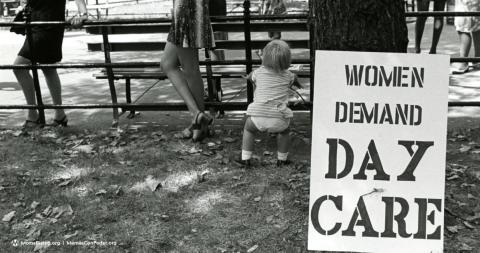
Child Care 101 : A History of Child Care in the U.S and the Nixon Veto
Our Child Care 101 Blog Series focuses on informing and educating voters who want to support child care.
Today, as moms, children and families struggle to access and afford quality child care, and as early educators face increasing wage gaps and disparities, it's important to understand that this crisis is unfortunately nothing new. Instead it is a legacy of devaluing and marginalizing the work of women and mothers, especially women of color and Black women.
The National Women’s Law Center's Fatima Graves uplifted the history of Black caregivers in her article “The roots of our child care crisis are in the legacy of slavery” stating that “one in five child care providers is a Black woman, and the erasure of their labor from public life and public conversations has historical roots dating back to chattel slavery”. She continues “The invisibility of child care workers today can be connected directly to the invisibility of Black women who provided care both as coerced labor and underpaid workers before and after the Civil War in conditions that made it difficult to also care for their own children. While white womanhood in the Antebellum South was depicted as embodying grace and leisure, the labor of Black women they relied upon, from domestic chores to feeding white infants at their own breast, was rarely noted nor mentioned.”
Post civil-war, many white families continued to rely heavily on unpaid or grossly underpaid Black domestic workers to nurture and raise their children, often at the expense of their own. This went on for decades and even today, child care workers (who are disproportionately made up of women of color), are some of the lowest paid workers.
But there were powerful efforts to give moms and families the support they need. In 1971, leaders like Dorothy Bolden, Shirley Chisholm, Marian Wright Edelman, and Evelyn Moore led campaigns that brought about the Comprehensive Child Development Act of 1971, promoting child care workers as "middle-class experts" deserving of fair wages for the service they provide working families. Buoyed by support from labor unions, it passed both houses of Congress with bipartisan majorities. However, President Richard Nixon vetoed the bill, eliminating the chance for a multibillion-dollar national child care system. WHY WOULD HE VETO THIS? Well, because of racism. The structure of the child care system in this bill would have put control of publicly-funded child care centers in local hands which, in much of the South, meant challenging white state governments in favor of local control by Black communities and leaders. As a means to keep their hold on segregation, conservative activists lobbied heavily against the bill, and based on this the then President Nixon issued his veto ending the last major Congressional push for a fair and just universal child care system.
Nixon’s veto and our government’s limited bandaid solutions over the decades since then have cost our economy billions of dollars every year since, and pushed moms and caregivers out of much-needed jobs due to unaffordable or inaccessible childcare, all while denying generations of parents a fair shot and peace of mind. And the ongoing devaluing of child care continues the systemic lack of value our society places on the labor of Black, brown, and immigrant women.
Undermining and not prioritizing child care as a crucial issue and not paying child care workers what they deserve needs to be a relic of the past. We can and must do better, and it is informed, empowered voters like YOU who can help stem the tide on this infuriating legacy of child care. Our moms, children, families and caregivers deserve a brighter future and together we can get there.
Be sure to check out our other blogs in this series
Child Care 101 : Early Childhood Educators and the Wage Gap
Child Care 101: Child Care Deserts
Child Care 101: The Child Care and Development Block Grant (CCDBG)



The views and opinions expressed in this post are those of the author(s) and do not necessarily reflect those of MomsRising.org.
MomsRising.org strongly encourages our readers to post comments in response to blog posts. We value diversity of opinions and perspectives. Our goals for this space are to be educational, thought-provoking, and respectful. So we actively moderate comments and we reserve the right to edit or remove comments that undermine these goals. Thanks!